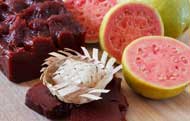
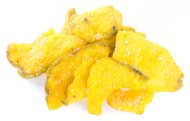
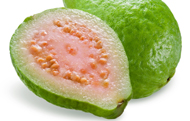
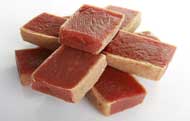

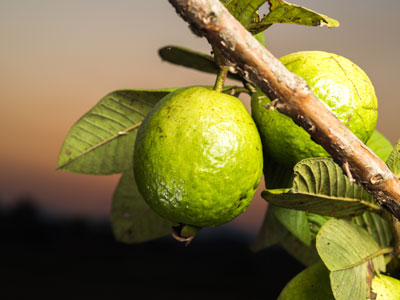
1. Guava Facts
2. Types of Guava
3. Nutritional Value of Guava
4. Health Benefits of Guava
The scientific name for guava is Psidium guajava, and it belongs to the family Myrtaceae. This is the common guava, a species native to tropical regions of the Americas that is now cultivated widely around the world.
Psidium guajava, the common guava, yellow guava, lemon guava, or apple guava is an evergreen shrub or small tree native to the Americas. It is pollinated by insects. When cultivated, it is pollinated mainly by the common honeybee, Apis mellifera.
Guava fruits can range in size from as small as an apricot to as large as a grapefruit. Various cultivars have white, pink, or red flesh; a few varieties feature red (instead of green or yellow) skin.
When cultivated from seed, guavas are notable for their extremely slow growth rate for several months, before a very rapid acceleration in growth rate takes over. From seed, common guavas may bloom and set fruit in as few as two years or as many as eight. Cuttings, grafting, and air layering are more commonly used as a propagation method in commercial groves. Highly adaptable, guavas can be easily grown as container plants in temperate regions, though their ability to bloom and set fruit is somewhat less predictable.
History and Origin
Guavas originated in tropical America, likely from Mexico to Peru, and were cultivated as early as 2500 BC in Peru. Spanish and Portuguese explorers spread them to the Philippines, India, and other parts of Asia, Africa, and Australia during the Age of Exploration. Today, guavas are cultivated throughout the world's tropical and subtropical regions and are considered a staple in many cultures.
- • Thai White
- • Thai Pink
- • Apple Guava
- • Cherry Guava
- • Mexican Cream
- • Yellow Cherry
- • Hawaiian Pink
- • Strawberry Guava
- • Indian Guava
- • Red Malaysian
- • Dwarf Brazilian Guava
Common guava varieties sold in Australia include Thai White, Thai Pink, and Apple Guava. Other types grown and sold, especially through specialty nurseries, include Mexican Cream, Yellow Cherry, Hawaiian Pink, and Strawberry Guava. The most common varieties, Thai White and Pink, are widely available, while others are more common in regional markets or through online suppliers.
Common varieties
Thai White: Green skin with white flesh and a milder sweetness.
Thai Pink: Pinkish-white flesh that is often sweeter than Thai White.
Apple Guava: Green skin with pink flesh.
Cherry Guava: Smaller than other guavas, with red skin and white flesh.
Other varieties
Mexican Cream: A crunchy variety with large seeds and a sweet-sour flavour.
Yellow Cherry: Also called Lemon Guava.
Hawaiian Pink: A popular variety that produces a large crop.
Strawberry Guava: A smaller, red-skinned variety.
Indian Guava: Such as the Allahabad variety, which has pink flesh.
Red Malaysian: Also known as Purple Malay and is sometimes grown in pots.
Dwarf Brazilian Guava: A smaller, more compact variety.
Fruit ” Guava ” ( Nutritional value )
Nutritional value per 100 g
Guavas, common, raw
|
Nutrient ( Proximate’s )
|
Unit
|
Value
|
Daily Value %
|
|
Energy
|
kcal
|
68
|
3.4%
|
|
Protein
|
g
|
2.55
|
5.1%
|
|
Total lipid (fat)
|
g
|
0.95
|
1.2%
|
|
Carbohydrate, by difference
|
g
|
14.32
|
5.2%
|
|
Fiber, total dietary
|
g
|
5.4
|
19.2%
|
|
Sugars, total
|
g
|
8.92
|
|
|
Minerals
|
|||
|
Calcium, Ca
|
mg
|
18
|
1.3%
|
|
Iron, Fe
|
mg
|
0.26
|
1.4%
|
|
Magnesium, Mg
|
mg
|
22
|
5.2%
|
|
Phosphorus, P
|
mg
|
40
|
3.2%
|
|
Potassium, K
|
mg
|
417
|
8.8%
|
|
Sodium, Na
|
mg
|
2
|
0.08%
|
|
Zinc, Zn
|
mg
|
0.23
|
2.0%
|
|
Copper, Cu
|
mg
|
0.230
|
25.5%
|
|
Manganese, Mn
|
mg
|
0.150
|
6.5%
|
|
Selenium, Se
|
mcg
|
0.6
|
1.0%
|
|
Vitamins
|
|||
|
Vitamin C, total ascorbic acid
|
mg
|
228.3
|
253.6%
|
|
Thiamin (B-1)
|
mg
|
0.067
|
5.5%
|
|
Riboflavin (B-2)
|
mg
|
0.040
|
3.0%
|
|
Niacin (B-3)
|
mg
|
1.084
|
6.7%
|
|
Pantothenic acid (B-5)
|
mg
|
0.451
|
9.0%
|
|
Vitamin B-6
|
mg
|
0.110
|
6.4%
|
|
Vitamin B-12
|
mg
|
0.00
|
|
|
Folate DFE (dietary folate) (B-9)
|
mcg
|
49
|
12.2%
|
|
Vitamin A, RAE (retinol)
|
mcg
|
31
|
3.4%
|
|
Vitamin E (alpha-tocopherol)
|
mg
|
0.73
|
4.8%
|
|
Vitamin D (D2 + D3)
|
mcg
|
0
|
|
|
Vitamin K (phylloquinone)
|
mcg
|
2.6
|
2.1%
|
|
Lipids
|
|||
|
Saturated Fatty Acids
|
g
|
0.272
|
1.3%
|
|
Monounsaturated Fatty Acids
|
g
|
0.087
|
|
|
Polyunsaturated Fatty Acids
|
g
|
0.401
|
|
|
Trans Fatty Acids
|
g
|
0.000
|
|
|
Carotenoids
|
|||
|
Beta-Carotene
|
mcg
|
374
|
|
|
Lycopene
|
mcg
|
5204
|
|
|
Lutein + zeaxanthin
|
mcg
|
0
|
|

|
Reference Values are based on a 2,000 Calorie Intake, for Adults and Children 4 or More Years of Age. Your daily values may be higher or lower depending on your calorie needs.
|
|
Percentages are roughly approximated using (RDA) Recommended Dietary Allowances for adults. Source: Nutrient Database – USDA (United States Department of Agriculture)
|
|
Reference Values for Nutrition – FDA U.S. Food and Drug Administration
|
Guava Nutritional Value
Guava is rich in vitamins, fiber, and antioxidants, providing benefits such as boosting the immune system, aiding digestion, promoting heart health, and supporting blood sugar control. Its high vitamin C content strengthens immunity and skin health, while its fiber content regulates digestion and may support weight management. Guava can also help with menstrual cramps and has potential anti-inflammatory and antioxidant effects.
- BOOSTS IMMUNITY
Guava boosts immunity primarily because it is packed with vitamin C, a key nutrient for a strong immune system. This fruit contains more vitamin C than oranges, helping your body fight off infections, colds, and flu. Beyond vitamin C, guava also contains antioxidants and other compounds that support the immune system. - SUPPORTS GUT HEALTH
Guava supports gut health due to its high fiber content, which promotes regularity and feeds beneficial gut bacteria. Additionally, it has natural antibacterial properties that can help with digestive issues like diarrhea and contains vitamins that support the gut lining and immune function. - AIDS WOUND HEALING
Guava leaves may help with wound healing due to compounds that promote cell regeneration and have anti-inflammatory, antioxidant, and antibacterial properties. Studies have shown guava leaf extract can accelerate wound healing and form scars faster than some conventional products, but its effectiveness can vary, and it might cause skin irritation in some individuals. It is essential to consult a doctor before using guava as a topical treatment or supplement. - SUPPORTS HAIR HEALTH
Guava supports hair health by providing essential vitamins, antioxidants, and other nutrients that promote growth, prevent damage, and strengthen hair from the roots. It is rich in Vitamin C, which boosts collagen production for stronger hair follicles and acts as an antioxidant to fight free radicals. Guava also contains Vitamin A, which helps keep the scalp moisturized, and essential fatty acids like linoleic acid that lock in moisture. - IMPROVES DIGESTION
Guava improves digestion due to its high fiber content, which helps regulate bowel movements and can relieve both constipation and diarrhoea. The fruit also contains natural antimicrobial properties that can support a healthy gut microbiome. Additionally, guava leaf extract has been shown to help with digestive issues like diarrhoea.
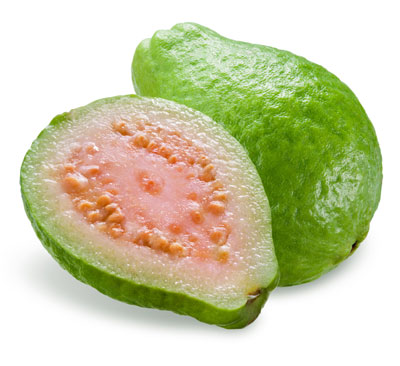
- SUPPORTS HEART HEALTH
Guava supports heart health by helping to regulate blood pressure and cholesterol levels through its high content of potassium, fiber, and antioxidants. It can contribute to lower blood pressure and lower “bad” LDL cholesterol while increasing “good” HDL cholesterol. The fruit's magnesium content may also help in stress reduction, which is beneficial for heart health. - PROMOTES HEALTHY SKIN
Guava promotes healthy skin by providing vitamins and antioxidants that fight aging, boost collagen, and improve tone. Its high concentration of vitamin C helps protect against free radical damage, while other compounds like lycopene and beta-carotene reduce signs of aging and improve skin texture. Guava's astringent properties can also help with blemishes, and its leaves may have benefits for acne. - BLOOD SUGAR MANAGEMENT
Guava can aid blood sugar management due to its low glycaemic index, high fiber, and compounds that may inhibit sugar absorption and improve insulin sensitivity. The fruit is a low-glycaemic food, while guava leaf extracts have demonstrated potential in inhibiting enzymes involved in glucose absorption and activating beneficial cellular pathways, according to various studies, though more human clinical trial data is needed. - EASES MENSTRUAL CRAMPS
Guava leaf extract may help ease menstrual cramps by potentially reducing pain intensity. Some studies suggest that guava leaf extract could be more effective than painkillers in managing menstrual cramps and other symptoms like uterine bleeding. The fruit itself is also a good source of fiber, which can help support overall digestive health, and vitamin C, which boosts the immune system. - PROVIDES ANTIOXIDANTS
Guava provides antioxidants, with compounds like vitamin C, lycopene, and flavonoids helping to neutralize free radicals. This antioxidant activity can protect against cell damage and may lower the risk of chronic diseases like heart disease and cancer.
References
Nutrient Database – USDA (United States Department of Agriculture)
Reference Values for Nutrition – FDA U.S. Food and Drug Administration
Boosts immunity - Guava boosts immunity primarily because it is packed with vitamin C, a key nutrient for a strong immune system. This fruit contains more vitamin C than oranges, helping your body fight off infections, colds, and flu. Beyond vitamin C, guava also contains antioxidants and other compounds that support the immune system.
Promotes healthy skin - Guava promotes healthy skin by providing vitamins and antioxidants that fight aging, boost collagen, and improve tone. Its high concentration of vitamin C helps protect against free radical damage, while other compounds like lycopene and beta-carotene reduce signs of aging and improve skin texture. Guava's astringent properties can also help with blemishes, and its leaves may have benefits for acne.
Aids wound healing - Guava leaves may help with wound healing due to compounds that promote cell regeneration and have anti-inflammatory, antioxidant, and antibacterial properties. Studies have shown guava leaf extract can accelerate wound healing and form scars faster than some conventional products, but its effectiveness can vary, and it might cause skin irritation in some individuals. It is essential to consult a doctor before using guava as a topical treatment or supplement.
Improves digestion - Guava improves digestion due to its high fiber content, which helps regulate bowel movements and can relieve both constipation and diarrhoea. The fruit also contains natural antimicrobial properties that can support a healthy gut microbiome. Additionally, guava leaf extract has been shown to help with digestive issues like diarrhoea.
Supports gut health - Guava supports gut health due to its high fiber content, which promotes regularity and feeds beneficial gut bacteria. Additionally, it has natural antibacterial properties that can help with digestive issues like diarrhoea and contains vitamins that support the gut lining and immune function.
Supports Heart health - Guava supports heart health by helping to regulate blood pressure and cholesterol levels through its high content of potassium, fiber, and antioxidants. It can contribute to lower blood pressure and lower “bad” LDL cholesterol while increasing “good” HDL cholesterol. The fruit's magnesium content may also help in stress reduction, which is beneficial for heart health.
Blood sugar management - Guava can aid blood sugar management due to its low glycaemic index, high fiber, and compounds that may inhibit sugar absorption and improve insulin sensitivity. Both the fruit and the leaves show promise: the fruit is a low-glycaemic food, while guava leaf extracts have demonstrated potential in inhibiting enzymes involved in glucose absorption and activating beneficial cellular pathways, according to various studies, though more human clinical trial data is needed for some applications.
Eases menstrual cramps - Yes, guava leaf extract may help ease menstrual cramps by potentially reducing pain intensity. Some studies suggest that guava leaf extract could be more effective than painkillers in managing menstrual cramps and other symptoms like uterine bleeding. The fruit itself is also a good source of fiber, which can help support overall digestive health, and vitamin C, which boosts the immune system.
Provides antioxidants - Yes, guava provides antioxidants, with compounds like vitamin C, lycopene, and flavonoids helping to neutralize free radicals. This antioxidant activity can protect against cell damage and may lower the risk of chronic diseases like heart disease and cancer.
Supports hair health - Guava supports hair health by providing essential vitamins, antioxidants, and other nutrients that promote growth, prevent damage, and strengthen hair from the roots. It is rich in Vitamin C, which boosts collagen production for stronger hair follicles and acts as an antioxidant to fight free radicals. Guava also contains Vitamin A, which helps keep the scalp moisturized, and essential fatty acids like linoleic acid that lock in moisture.
